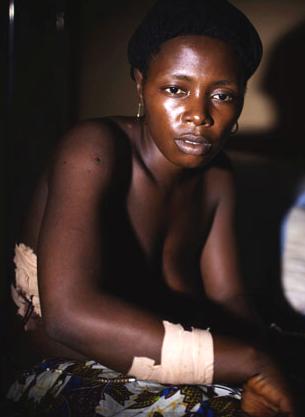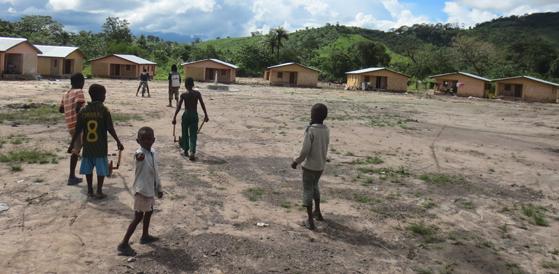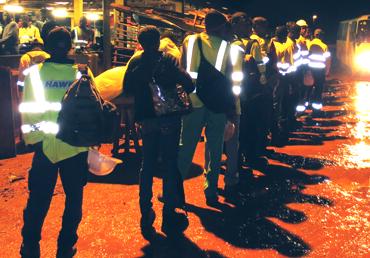Wednesday February 19, 2014
- Human
Rights Watch slams London Mining in report out
today. A new 96-page report throws light on a
number of issues relating to the company's
operations and its treatment and relationships
with workers, traditional authority, labour
unions and that Bumbuna protest in which Musu
Conteh was murdered by a Sierra Leone police
armed with weapons of war. "Sierra Leonean authorities should also meaningfully address
longstanding human rights problems such as corruption, opaque
governance, unrestrained security forces, lack of clarity in land
ownership, and abuses of authority by powerful local chiefs."
According to Human Rights
Watch, The 96-page report,
“Whose
Development?: Human Rights Abuses in Sierra Leone’s Mining Boom,” documents how the government
and London-based African Minerals Limited forcibly relocated
hundreds of families from verdant slopes to a flat, arid area in
Tonkolili District. As a result, residents lost their ability to
cultivate crops and engage in income generating activities that once
sustained them.
Police carried out a bloody crackdown in the town of Bumbuna in April 2012 to quell a protest by workers who went on
strike after being barred from forming a union of their own
choosing.
The report's author
Rona Peligal, deputy
Africa director at Human Rights Watch insists that "the African Minerals Limited case shows that, unless the government
puts a stop to mining operation abuses, the people who most need to
benefit from development will be excluded from it.”
Human Rights Watch
claimed to have interviewed "close to 100 people
in Sierra Leone for the report" adding that over
an 18-month period it did research into the
operations of the company meeting with top guns
and asking questions the government would never
dare to ask. This raises questions on the
stewardship of the government whose duty, it
should be, to engage in activities that best
serve the interests of Sierra Leoneans whose
natural resources are being exploited to enrich
the few in government and ruling APC party.
Human Rights Watch
reminded all and sundry just where Sierra Leone
is coming from and the need for an extractive
company like London Mining and more so the
government to be aware of getting involved in
acts that would prove detrimental to both
company and the people of Sierra Leone.
"Sierra Leone is an impoverished West African country still
recovering from a catastrophic civil war that ended in 2002. African
Minerals Limited, which began mining diamonds in Sierra Leone in
1996, built its Tonkolili mine on what is regarded as one of the
largest deposits of magnetite in Africa, a type of iron ore. The
company exports the ore to steelmakers in China.
The Sierra Leonean government, while promoting the company’s
operations as essential to Sierra Leone’s economic development,
permitted corporate actions that violated the rights of Tonkolili’s
residents, Human Rights Watch found. For example, the government
failed to provide adequate oversight of the company’s consultations
with local communities or respond to repeated complaints about the
forced relocation of residents. Both the government and the company
misled villagers about what would happen once they were moved to the
new site."
Human Rights Watch
slammed the government for what the organisation
sees as a deliberate ploy by State House to
please extractive companies rather than the
people whose resources were being exploited -
"The government also did not take action in response to apparent
African Minerals Limited violations of Sierra Leone labor laws
concerning employment, termination, and benefits for its workers.
The government’s narrow reading of national labor law as well as
political wrangling denied the company’s workers the ability to form
a union of their choosing, rather than belong to an established
union that the workers regarded as ineffectual."
It went on -
The Sierra Leonean government, while promoting the company’s
operations as essential to Sierra Leone’s economic development,
permitted corporate actions that violated the rights of Tonkolili’s
residents, Human Rights Watch found. For example, the government
failed to provide adequate oversight of the company’s consultations
with local communities or respond to repeated complaints about the
forced relocation of residents. Both the government and the company
misled villagers about what would happen once they were moved to the
new site.
“The company went to the paramount chief, and the paramount chief
told us what to do. We asked so many questions. What they told us
they would do, they have not done.… It was a trap,” one village
elder told Human Rights Watch. “They said, ‘It will be paradise for
you,’ but it’s completely different.”
Human Rights Watch
briefly put the spotlight on the rat's so-called
Agenda -
The government of President Ernest Koroma, re-elected in 2012, is
aggressively pursuing an “Agenda for Prosperity,” supported by
bilateral donors, the World Bank, the International Monetary Fund (IMF),
and corporations attracted by the country’s mineral riches and
fertile land. The strategy has yielded high rates of growth; in
2012, Sierra Leone’s economy grew by 21 percent, the fastest in
sub-Saharan Africa, according to the IMF.
That growth, however, has not necessarily been matched by improved
living conditions for Sierra Leone’s six million people, Human
Rights Watch said. The country has ranked as one of the poorest in
the world for many years, according to the United Nations
Development Programme’s Human Development Index.
Corruption and the
lack of transparency interfere with Sierra Leone’s progress. The
Extractive Industry Transparency Initiative in February 2013
suspended Sierra Leone’s bid for membership after the government
failed to sufficiently address discrepancies in recording revenue or
payments by companies.
“Is the growth going to foster corruption and sow conflict?” one
Sierra Leonean, then working for a development agency, said. “The
whole point is to improve the lives of citizens. If that doesn’t
happen, then what’s the point?”
The new report by the
rights organisation also has some piece of
advice for the government embedded in a number
of recommendations.
Human Rights Watch recommendations to the government include to:
-
Provide sufficient resources for the Labor Ministry to
oversee and inspect labor conditions throughout the country and
allow multiple unions within the same industry;
-
Put into effect Sierra Leone’s new law on access to
information and publicize all mining contracts;
-
Clarify the role of paramount chiefs in questions of land
administration and ensure that the pending land law is
transparent and equitable; and
-
Provide immediate relief to the people who have been
forcibly relocated by large-scale land investments, and put in
place long-term measures to remedy negative human rights impacts
of relocation, particularly concerning access to food, water,
and livelihoods.
"The government should ensure that state land is allocated
transparently and in accordance with the rights of its occupants,
and allow residents to obtain accurate information – without fear of
reprisal – on the deployment of the country’s resources, Human
Rights Watch said.
Sierra Leonean authorities should also meaningfully address
longstanding human rights problems such as corruption, opaque
governance, unrestrained security forces, lack of clarity in land
ownership, and abuses of authority by powerful local chiefs. Protecting the rights of all Sierra Leoneans is not an option, but
a legal obligation,” Peligal said. “Particularly given Sierra
Leone’s history of conflict, promoting rights as part of the
country’s sustainable development is essential.”
The Voice of America has
this on its web pages -

Francis Munu is inspector general of the Sierra
Leone police. He says he appreciates the report
but not enough dialogue happened between Human
Rights Watch and the police before bringing
forth the recommendations.
"Although I had hoped that there would've been
better collaboration, consultations and
discussion before coming up with these
recommendations so that the recommendations
would've been more reflective of the Sierra
Leone police point of view. However, we still
look at them and will take them into good part,"
he said.
Munu also says the police are being targeted and
did what they felt was right at the time. "They
[police] handled it in their own way, even
though people have quarrels in the way they
handled it," he said.
Peligal says there have been some improvements
since the strike. Police did apologize for their
actions. African Minerals gave workers a 400
percent salary increase but more needs to be
done for those who were displaced in Bumbuna.
She says people were moved because African
Minerals needed to mine for the iron ore around
their homes. Many of them are farmers who have
lost their livelihoods.
For its part
London Mining
has provided answers to questions raised by
Human Rights Watch. It is a written response and
we would not be wrong in assuming that it was a
well-thought-out document that provided answers
to questions the government should have been
asking of the company rather than having a
rights group taking up matters on behalf of the
disadvantaged people of Sierra Leone whose
natural resources are being depleted all the
time.
Kindly read through the
African Minerals answers and you decide what
picture we have here in one of the many
extractive concerns that operate in Sierra
Leone...and ah yes, they were asked about the
shooting incident in
Bumbuna in which
Musu Conteh
was murdered.
It will be good for
those corruptly benefiting from the extractive
industry in Sierra Leone to take heed in this
statement from Human Rights Watch. It is also a
message to the donor community especially the
Bretton-Woods institutions of the IMF and World
Bank, who though having offices in Freetown
would be quick to bring out misleading
statements about how well the government is
managing the peoples' resources.
"To promote
rights-respecting
investments in
the country’s
bountiful
natural
resources , the
government of
Sierra Leone
should ensure
that state land
is allocated
transparently
and in
accordance with
the rights of
its occupants,
that all
affected
residents are
treated in
accordance with
international
standards, that
workers have the
ability to
organize and
join a union of
their own
choosing, and
that the broader
population may
obtain
information on
and question the
deployment of
the country’s
resources
without fear of
reprisal.
Genuine
accountability,
as detailed in
this report, is
crucial for the
inclusive growth
to which the
government and
its donors say
they aspire.
Sierra Leoneans
have a right to
participate in
the decisions
about their
country’s
economic and
political
future. Those
directly
affected by
investment
projects should
be meaningfully
consulted on the
impact of such
projects both in
the immediate
and longer
terms. This is
not only a
prudent
political
strategy, given
Sierra Leone’s
long history of
conflict, it is
also important
for sustainable
development and
for the
realization of
Sierra Leoneans’
full array of
rights."
|



